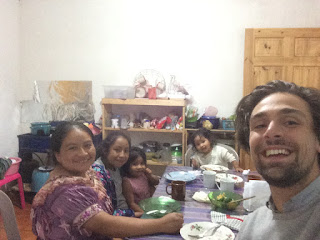¡Matyöx chawe Gilda!
¡Xseqër!
This blog post is about my host mother. I think it makes sense to talk about her and her wonderful family because there’s no doubt that the success of this field station goes hand in hand with the exceptional quality of the families that welcome us into their homes.
My host mom is a superhero. Mother of three beautiful and (almost all the time) well-behaved children, she holds various different jobs, multitasks practically everything, and is devoted to many political and sociocultural issues related to indigenous women’s rights, Mayan identity, and culture in Guatemala and Patzún. Gilda (who agreed to have her name published in this blog post) is a very active person. Every week, she helps her mother at the family business, which makes the best chiles rellenos in town. She also spends a lot of time and energy working for a cooperative of indigenous women called Ajsu’m. This cooperative not only provides a community of women with work, but also aims to offer workshops and training about current issues in Guatemalan society, specifically with respect to indigenous rights in communities around Patzún. (It’s also thanks to this great cooperative that we got to enjoy delicious meals every lunchtime of the week. ¡Matyöx Ajsu’m!)
With the family
On June 22nd, Gilda generously accepted to give us a workshop similar to those the cooperative usually gives in communities around Patzún. Her presentation focused on Mayan identity and women self-confidence, and how years of racism and stigmatization against indigenous peoples has led to an unhealthy societal climate. In the end, her talk was not only very inspiring, but much-needed. It is crucial that any researcher conducting work related to Mayan language and culture understand what issues are faced by communities that speak these languages and hold these cultures.
Gilda and Pedro discussing in the question period
I feel extremely grateful to have had the opportunity to know Gilda and her family, and I’m sure many of my colleagues have similar things to tell about their families. Again, without these beautiful families, which share their language and culture with us and which generously welcome us into their homes, there is no field station.
Nan Gilda, janila matyöx ruma xib’än compartir iwachoch, ichabäl chuqa’ ina’oj wik’en yïn.
Justin


Comments
Post a Comment